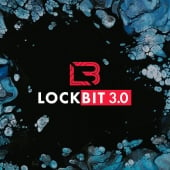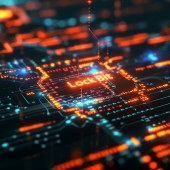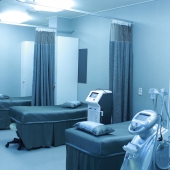-
The Week in Ransomware - March 1st 2024 - Healthcare under siege
Ransomware attacks on healthcare over the last few months have been relentless, with numerous ransomware operations targeting hospitals and medical services, causing disruption to patient care and access to prescription drugs in the USA.
- March 01, 2024
- 03:32 PM
 0
0
-
LockBit ransomware returns to attacks with new encryptors, servers
The LockBit ransomware gang is once again conducting attacks, using updated encryptors with ransom notes linking to new servers after last week's law enforcement disruption.
- February 28, 2024
- 01:31 PM
 0
0
-
LockBit ransomware returns, restores servers after police disruption
The LockBit gang is relaunching its ransomware operation on a new infrastructure less than a week after law enforcement hacked their servers, and is threatening to focus more of their attacks on the government sector.
- February 25, 2024
- 02:41 PM
 1
1
-
LockBit ransomware gang has over $110 million in unspent bitcoin
The LockBit ransomware gang received more than $125 million in ransom payments over the past 18 months, according to the analysis of hundreds of cryptocurrency wallets associated with the operation.
- February 23, 2024
- 01:13 PM
 0
0
-
New ScreenConnect RCE flaw exploited in ransomware attacks
Attackers are exploiting a maximum severity authentication bypass vulnerability to breach unpatched ScreenConnect servers and deploy LockBit ransomware payloads on compromised networks.
- February 22, 2024
- 01:34 PM
 0
0
-
LockBit ransomware secretly building next-gen encryptor before takedown
LockBit ransomware developers were secretly building a new version of their file encrypting malware, dubbed LockBit-NG-Dev - likely a future LockBit 4.0, when law enforcement took down the cybercriminal's infrastructure earlier this week.
- February 22, 2024
- 08:51 AM
 0
0
-
US offers $15 million bounty for info on LockBit ransomware gang
The U.S. State Department is now also offering rewards of up to $15 million to anyone who can provide information about LockBit ransomware gang members and their associates.
- February 21, 2024
- 11:22 AM
 0
0
-
Police arrest LockBit ransomware members, release decryptor in global crackdown
Law enforcement arrested two operators of the LockBit ransomware gang in Poland and Ukraine, created a decryption tool to recover encrypted files for free, and seized over 200 crypto-wallets after hacking the cybercrime gang's servers in an international crackdown operation.
- February 20, 2024
- 06:30 AM
 2
2
-
LockBit ransomware disrupted by global police operation
Law enforcement agencies from 10 countries have disrupted the notorious LockBit ransomware operation in a joint operation known as ''Operation Cronos."
- February 19, 2024
- 04:38 PM
 1
1
-
LockBit claims ransomware attack on Fulton County, Georgia
The LockBit ransomware gang claims to be behind the recent cyberattack on Fulton County, Georgia, and is threatening to publish "confidential" documents if a ransom is not paid.
- February 14, 2024
- 06:07 PM
 0
0
-
Bank of America warns customers of data breach after vendor hack
Bank of America is warning customers of a data breach exposing their personal information after one of its service providers was hacked last year.
- February 12, 2024
- 06:32 PM
 2
2
-
The Week in Ransomware - February 2nd 2024 - No honor among thieves
Attacks on hospitals continued this week, with ransomware operations disrupting patient care as they force organization to respond to cyberattacks.
- February 02, 2024
- 06:33 PM
 0
0
-
The Week in Ransomware - January 26th 2024 - Govts strike back
Governments struck back this week against members of ransomware operations, imposing sanctions on one threat actor and sentencing another to prison.
- January 27, 2024
- 12:19 PM
 0
0
-
The Week in Ransomware - January 12th 2024 - Targeting homeowners' data
Mortgage lenders and related companies are becoming popular targets of ransomware gangs, with four companies in this sector recently attacked.
- January 12, 2024
- 05:06 PM
 1
1
-
Capital Health attack claimed by LockBit ransomware, risk of data leak
The Lockbit ransomware operation has claimed responsibility for a November 2023 cyberattack on the Capital Health hospital network and threatens to leak stolen data and negotiation chats by tomorrow.
- January 08, 2024
- 10:53 AM
 0
0
-
The Week in Ransomware - December 29th 2023 - LockBit targets hospitals
It's been a quiet week, with even threat actors appearing to take some time off for the holidays. We did not see much research released on ransomware this week, with most of the news focusing on new attacks and LockBit affiliates increasingly targeting hospitals.
- December 29, 2023
- 03:39 PM
 0
0
-
Lockbit ransomware disrupts emergency care at German hospitals
German hospital network Katholische Hospitalvereinigung Ostwestfalen (KHO) has confirmed that recent service disruptions were caused by a Lockbit ransomware attack where the threat actors gained access to IT systems and encrypted devices on the network.
- December 27, 2023
- 04:05 PM
 1
1
-
The Week in Ransomware - December 22nd 2023 - BlackCat hacked
Earlier this month, the BlackCat/ALPHV ransomware operation suffered a five-day disruption to their Tor data leak and negotiation sites, rumored to be caused by a law enforcement action.
- December 22, 2023
- 04:20 PM
 0
0
-
The Week in Ransomware - December 15th 2023 - Ransomware Drama
The big news over the past two weeks is the continued drama plaguing BlackCat/ALPHV after their infrastructure suddenly stopped working for almost five days. Multiple sources told BleepingComputer that this outage was related to a law enforcement operation, but BlackCat claims the outages were caused by a hardware/hosting issue.
- December 15, 2023
- 04:18 PM
 0
0
-
LockBit ransomware now poaching BlackCat, NoEscape affiliates
The LockBit ransomware operation is now recruiting affiliates and developers from the BlackCat/ALPHV and NoEscape after recent disruptions and exit scams.
- December 13, 2023
- 01:22 PM
 0
0

























